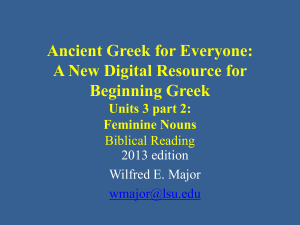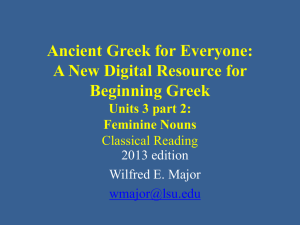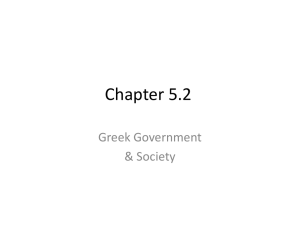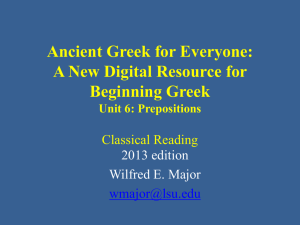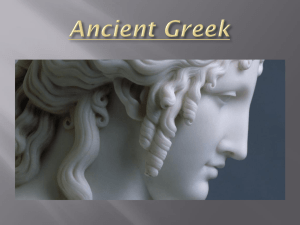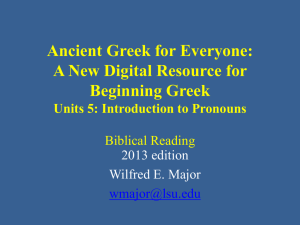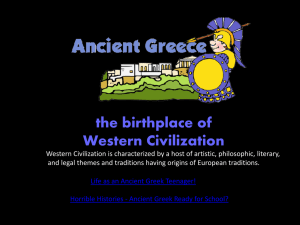Biblical reading - GREEK help at LSU
advertisement
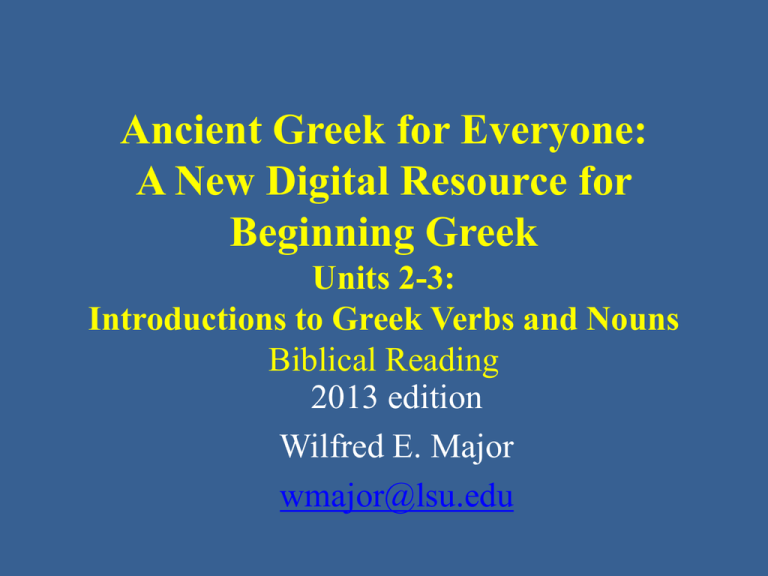
Ancient Greek for Everyone: A New Digital Resource for Beginning Greek Units 2-3: Introductions to Greek Verbs and Nouns Biblical Reading 2013 edition Wilfred E. Major wmajor@lsu.edu Ancient Greek for Everyone • This class – Unit 3 part 1 Biblical reading. – Be able to: • read the sentences aloud • parse each verb and noun (with article where it appears) • translate the sentences into English. Ancient Greek for Everyone • All the sentences here come from ancient Greek writings related to the Bible, Jewish history and early Christianity. The passages are unchanged, except where … indicates a short omission. • To provide context for the quotation, there are brief introductions for the writings and stories. • At the bottom of each slide are vocabulary entries and notes. These supply vocabulary and information for any words that have not yet appeared in the required vocabulary. Ancient Greek for Everyone • Hebrew scripture was translated into koine Greek in the second century B.C., a collection called the Septuagint. • Early Christian writings cite scripture from the Septuagint and culled the Old Testament from it. • The Septuagint derives its name from the Latin versio septuaginta interpretum, "translation of the seventy interpreters," (Greek: ἡ μετάφρασις τῶν ἑβδομήκοντα, "translation of the seventy." The Roman numeral LXX (seventy) is commonly used as an abbreviation. • The following readings are quoted from the Septuagint. Ancient Greek for Everyone • God calls out to Adam in the Garden of Eden: ποῦ εἶ; • Adam responds in part: γυμνός εἰμι LXX Gen. 3:9 ποῦ where? γυμνός (nom sg) ὁ naked Ancient Greek for Everyone • King David, after putting down a rebellion by his son Absalom, who died in the fighting, is in mourning. Joab, nephew to David, chastises him, saying that such grief disrespects those who serve in David’s loyal army. It sends the message, Joab says, that: οὔκ εἰσιν οἱ ἄρχοντές σου οὐδὲ παῖδες LXX 2 Kings 19:7 οὐδέ and not, nor σου your Ancient Greek for Everyone • After suffering much at Satan’s hands, Job is visited by friends who seek to reassure him of God’s justice. At one point, Job throws one of his friends’ own questions back at him: Ποῦ ἐστιν οἶκος ἄρχοντος; LXX Job 21:28 οἶκος (nom sg) ὁ home ποῦ where? Ancient Greek for Everyone • The prophet Isaiah imagines an appeal in the face of God’s wrath: Σὺ μόνος εἶ ἄρχων LXX Is. 10:8 μόνος (nom sg) ὁ only σύ (nom sg) you Ancient Greek for Everyone • In the Maccabean revolt, Jews rebelled against persecution by King Antiochus IV. At one point, royal forces attack a group of rebels and challenge them to repent and surrender. The rebels refuse, saying in part: ἀκρίτως ἀπόλλυτε ἡμᾶς. LXX 1 Maccabees 2:37 ἀκρίτως illegally, unjustly ἡμᾶς (acc pl) us Ancient Greek for Everyone • The following reading is quoted from the New Testament. Ancient Greek for Everyone • As Jesus teaches in Jerusalem, some wonder about his claims and how it is that he is allowed to preach openly at the temple: ἀληθῶς ἔγνωσαν οἱ ἄρχοντες ὅτι οὗτός ἐστιν ὁ Χριστός; κατὰ Ἰωάννην 7:26 ἀληθῶς truly ἔγνωσαν (3d pl) knew ὅτι that οὗτος (nom sg) ὁ this (man) Ancient Greek for Everyone • In addition to scripture, a wide range of related writings were popular with early Christians and these circulated in a range of languages, especially Greek. • Among these writings were romantic stories about an early Christian named Clement. While there were multiple historically important men named Clement in the early Christian church, these stories focus on a Clement who travelled with the apostle Peter. • The Clementine Homilies is a collection of such stories. Ancient Greek for Everyone • The Clementine Homilies includes an extended version of the conflict between the apostle Peter and Simon Magus (cf. Acts 8:9-24). Peter wins over one of Simon’s disciples, Zacchaeus, and makes him bishop of Caeserea. As part of the process of installing Zacchaeus, Peter prays to God: σὺ γὰρ ἄρχων ἀρχόντων (εἶ) Homily 3 72.3 γάρ because σύ (nom sg) you

